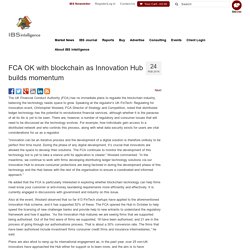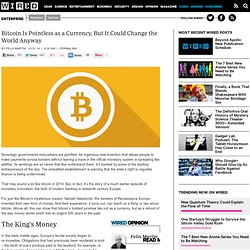

Cryptojacking Has Gotten Out of Control. Bitcoin Technology Harnessed to Push Electricity Revolution. Bitcoin technology is starting to seep into the electricity business, shaking up the way payments are managed every time a light switch is flipped.

From New York to Vienna, researchers and utilities are adapting the cloud-based ledger system used to track bitcoins as a replacement for slower administrative systems that require constant human input and multiple spreadsheets. $72 Million In Bitcoins Stolen From Hong Kong Exchange. A man walks past a display cabinet containing models of bitcoins in Hong Kong on Wednesday.

Anthony Wallace/AFP/Getty Images hide caption toggle caption Anthony Wallace/AFP/Getty Images A man walks past a display cabinet containing models of bitcoins in Hong Kong on Wednesday. Anthony Wallace/AFP/Getty Images A bitcoin exchange in Hong Kong has been hit by a major theft: Nearly 120,000 units of the digital currency were stolen. Central banks want to issue natl digital currencies, but are govts ready? #blockchain. FCA OK with blockchain as Innovation Hub builds momentum. The UK Financial Conduct Authority (FCA) has no immediate plans to regulate the blockchain industry, believing the technology needs space to grow.

Speaking at the regulator’s UK FinTech: Regulating for Innovation event, Christopher Woolard, FCA Director of Strategy and Competition, noted that distributed ledger technology has the potential to revolutionise financial services, although whether it is the panacea of all its ills is yet to be seen. There are, however, a number of regulatory and consumer issues that will need to be discussed as the technology evolves. For example, how individuals gain access to a distributed network and who controls this process, along with what data security exists for users are vital considerations for us as a regulator.
The Future of Money: Ten Megatrends and Six Movers and Shakers to Watch. Money is the primary mechanism for storing and exchanging value, especially in our daily purchases, and it’s heading rapidly into a faster, smarter and more mobile future.

Nevertheless, the constant in the midst of change will remain levels of human trust in the proliferating forms of money. That’s because we have an ancient and abiding partnership with money and no relationship is ever sustainable without trust. It’s a time of accelerated innovation in this field due to the rapid global expansion of digital banking, especially online and mobile financial services. However, while payments and transfer of money shift inexorably towards mobile devices as the consumer technology of choice, digital currencies expand in scope and number and online shopping begins to enter a golden age, cash is still the most successful and popular form of money ever. Its trust level, as public money backed up by a promise to pay from the government which minted and manufactured it, remains extremely high.
The Tech Under Bitcoin Could Verify Your Real Estate Records Online. Welcome to Forbes. MIT's 'Enigma' Uses Bitcoin Blockchain to Create Privacy-Enhancing, Decentralized Computation Platform. The MIT Media Lab has unveiled that it is working on a Bitcoin-based encryption system that lets users securely share data over a decentralized computational network.

The system, called Enigma, could offer drastically improved privacy features on the Internet. MIT's 'Enigma' Uses Bitcoin Blockchain to Create Privacy-Enhancing, Decentralized Computation Platform. Brian Forde joins the MIT Media Lab as director of digital currency. Brian Forde, former White House senior advisor for mobile and data innovation, has joined the MIT Media Lab as director of digital currency.

In this newly created position, Forde will work with researchers across the Institute and leading experts at other universities around the world in a new initiative to address some of the most critical challenges to creating a safe, stable, and secure digital currency. “We are fortunate to have Brian join the Media Lab to help organize an important research agenda to get cryptocurrencies right,” Media Lab Director Joi Ito says. Bitcoin Is Pointless as a Currency, But It Could Change the World Anyway. Sovereign governments everywhere are petrified.

An ingenious new invention that allows people to make payments across borders without leaving a trace in the official monetary system is spreading like wildfire. Its workings are so clever that few understand them. How the Bitcoin protocol actually works. Many thousands of articles have been written purporting to explain Bitcoin, the online, peer-to-peer currency.

Most of those articles give a hand-wavy account of the underlying cryptographic protocol, omitting many details. Even those articles which delve deeper often gloss over crucial points. My aim in this post is to explain the major ideas behind the Bitcoin protocol in a clear, easily comprehensible way. We’ll start from first principles, build up to a broad theoretical understanding of how the protocol works, and then dig down into the nitty-gritty, examining the raw data in a Bitcoin transaction. Understanding the protocol in this detailed way is hard work. I’ll describe Bitcoin scripting and concepts such as smart contracts in future posts. Where can I use bitcoin? Goldman Sachs: Bitcoin Is Not A Currency. Goldman Sachs thinks that bitcoin believers need to take a cold shower, drink some coffee, and sober up. In the wake of Mt. Gox’s collapse, the supposed outing of Bitcoin’s creator, and some high profile arrests the financial services firm has put together an exhaustive survey of “Bitcoin” and “bitcoin” and ultimately finds the technology promising but the currency wanting.
The key takeaway: Bitcoin likely can’t work as a currency, but … the ledger-based technology that underlies it could hold promise.